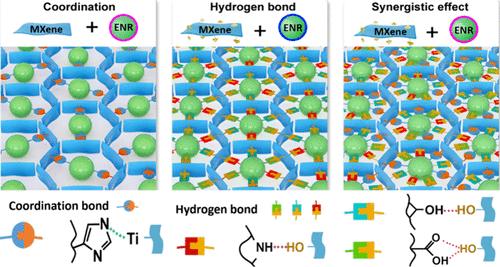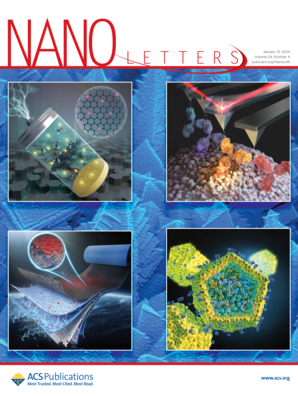重访MXene/橡胶弹性体的界面动力学:鲁棒自修复传感器协同键合的多尺度机械洞察
IF 9.1
1区 材料科学
Q1 CHEMISTRY, MULTIDISCIPLINARY
引用次数: 0
摘要
基于具有自愈合能力的 MXene/橡胶的先进柔性应变传感器可在反复变形后恢复受损性能,有望改变未来的可变形电子器件。尽管这些传感器潜力巨大,但要在单一系统中集成出色的自愈合性能和超强的机械强度仍是一项重大挑战,原因在于界面结构简单、键合薄弱,以及对 MXene/rubber 界面动力学的了解有限。为了解决这个问题,我们开发了一种新型金属配位键方案,通过与动态氢键的协同作用来增强界面键合强度,从而实现出色的机械性能和自愈性能。利用原位同步辐射技术对 MXene/橡胶界面动力学进行的多尺度研究提供了宝贵的见解,将结合强度与机械性能联系起来。这些发现不仅加深了我们对可变形电极中界面演变的理解,还为设计具有优异机械性能的先进自愈合应变传感器提供了一条大有可为的途径。本文章由计算机程序翻译,如有差异,请以英文原文为准。

Revisiting the Interface Dynamics of MXene/Rubber Elastomers: Multiscale Mechanistic Insights into Collaborative Bonding for Robust Self-Healing Sensors
Sophisticated flexible strain sensors based on MXene/rubber with self-healing capabilities are poised to transform future deformable electronics by restoring impaired performance after repeated deformation. Despite their potential, integrating excellent self-healing properties with superior mechanical strength in a single system remains a significant challenge due to simplistic interface architectures with weak bonds and limited understanding of MXene/rubber interface dynamics. To address this, a novel metal coordination bonding scheme has been developed, synergizing with dynamic hydrogen bonding to enhance interface bonding strength, enabling both outstanding mechanical and self-healing properties. Using in situ synchrotron radiation techniques, a multiscale investigation of MXene/rubber interface dynamics provides valuable insights, linking bonding strength to mechanical performance. These findings not only deepen our understanding of interface evolution in deformable electrodes but also offer a promising path for designing advanced self-healable strain sensors with superior mechanical properties.
求助全文
通过发布文献求助,成功后即可免费获取论文全文。
去求助
来源期刊

Nano Letters
工程技术-材料科学:综合
CiteScore
16.80
自引率
2.80%
发文量
1182
审稿时长
1.4 months
期刊介绍:
Nano Letters serves as a dynamic platform for promptly disseminating original results in fundamental, applied, and emerging research across all facets of nanoscience and nanotechnology. A pivotal criterion for inclusion within Nano Letters is the convergence of at least two different areas or disciplines, ensuring a rich interdisciplinary scope. The journal is dedicated to fostering exploration in diverse areas, including:
- Experimental and theoretical findings on physical, chemical, and biological phenomena at the nanoscale
- Synthesis, characterization, and processing of organic, inorganic, polymer, and hybrid nanomaterials through physical, chemical, and biological methodologies
- Modeling and simulation of synthetic, assembly, and interaction processes
- Realization of integrated nanostructures and nano-engineered devices exhibiting advanced performance
- Applications of nanoscale materials in living and environmental systems
Nano Letters is committed to advancing and showcasing groundbreaking research that intersects various domains, fostering innovation and collaboration in the ever-evolving field of nanoscience and nanotechnology.
 求助内容:
求助内容: 应助结果提醒方式:
应助结果提醒方式:


